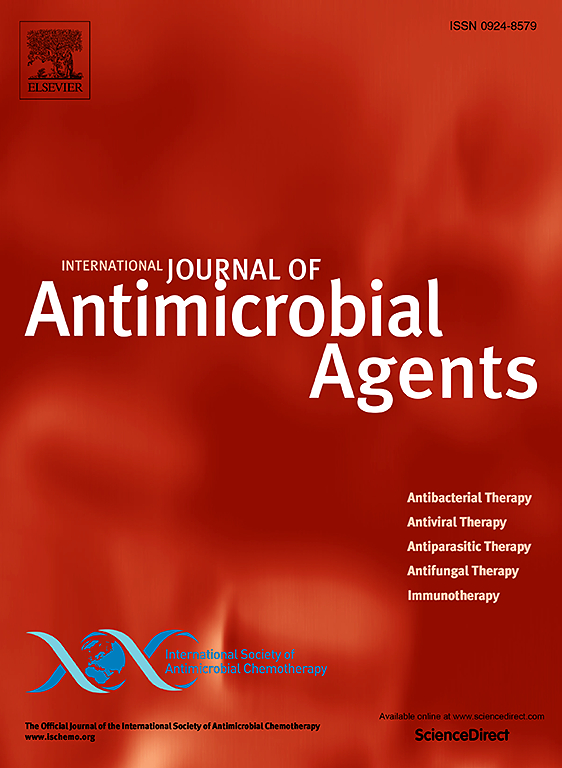噬菌体增强强力霉素抗慢性细菌性前列腺炎大肠杆菌活性。
IF 4.6
2区 医学
Q1 INFECTIOUS DISEASES
International Journal of Antimicrobial Agents
Pub Date : 2025-07-03
DOI:10.1016/j.ijantimicag.2025.107571
引用次数: 0
摘要
目的:耐药大肠杆菌引起的前列腺炎是一个重大的治疗挑战。噬菌体治疗是一种很有前途的抗菌策略。我们报告的情况下,患者前列腺炎引起的esbl生产大肠杆菌成功治疗与口服强力霉素和两个噬菌体鸡尾酒。在患者尿液中检测到支原体,支持强力霉素的使用。我们还在体外测试了相同的噬菌体-抗生素组合对一组不同的大肠杆菌菌株的作用。方法:患者口服SES和PYO噬菌体鸡尾酒,同时口服强力霉素30天。采用棋盘法对比包括患者菌株在内的5株大肠杆菌,评估强力霉素和噬菌体单独或联合使用的MIC值。使用改进的分数抑制浓度(FIC)指数评估协同作用。根据未经处理的对照和处理过的样品之间吸光度值(OD570)下降的百分比,用图解和相互作用图分析数据。在存在/不存在噬菌体和/或抗生素的情况下,绘制生长曲线24小时以监测细菌复制。结果:治疗后,微生物培养阴性,症状缓解。在体外,强力霉素与噬菌体在5株大肠杆菌中有3株存在协同/加性作用。对1株菌株有协同效应,对其余4株菌株有加性效应。生长曲线分析表明,与单独治疗相比,联合治疗可增强细菌生长抑制长达12小时。结论:虽然大肠杆菌对多西环素具有耐药性,但该抗生素可专门用于支原体感染。有趣的是,当抗生素与噬菌体联合抗大肠杆菌时,观察到的体外活性增强表明,这种联合可能有效根除由产esbl的大肠杆菌引起的慢性前列腺炎。本文章由计算机程序翻译,如有差异,请以英文原文为准。
Bacteriophage-enhanced doxycycline activity against Escherichia coli in chronic bacterial prostatitis
Objectives
Prostatitis caused by antibiotic-resistant Escherichia coli poses a significant treatment challenge, and phage therapy is emerging as a promising antibacterial strategy. Here we report the case of a patient with prostatitis caused by an extended spectrum β-lactamase-producing E. coli successfully treated with oral doxycycline and two phage cocktails. The use of doxycycline was supported by the detection of Mycoplasma spp. in the patient’s urine. We also tested the same phage-antibiotic combination against a panel of different E. coli strains in vitro.
Methods
A patient received oral SES and PYO phage cocktails alongside oral doxycycline for 30 days. The MIC values of doxycycline and phages alone and in combination were evaluated by checkboard assay versus five E. coli isolates, including the patient’s strain. Synergy was assessed using a modified fractional inhibitory concentration index. Data were analysed by synogram and an interaction plot based on the percentage reduction of the absorbance values (OD570) between untreated control and treated samples. Growth curves were performed over 24 h to monitor bacterial replication in the presence/absence of phage and/or antibiotic.
Results
After treatment microbiological cultures were negative and symptoms remitted. A synergistic/additive effect between doxycycline and the phages was observed in vitro in three out of five E. coli isolates. Synogram analysis showed a synergistic effect versus one strain, while an additive effect was observed for the other four isolates. Growth curve analysis demonstrated enhanced bacterial growth inhibition for up to 12 h with the combined treatment compared with either therapy alone.
Conclusions
Although the E. coli strain was resistant to doxycycline, the antibiotic was administered specifically to target the Mycoplasma infection. Interestingly, the enhanced in vitro activity observed when the antibiotic was combined with phages versus E. coli suggests that this combination may be effective at eradicating chronic prostatitis caused by extended spectrum β-lactamase-producing E. coli.
求助全文
通过发布文献求助,成功后即可免费获取论文全文。
去求助
来源期刊
CiteScore
21.60
自引率
0.90%
发文量
176
审稿时长
36 days
期刊介绍:
The International Journal of Antimicrobial Agents is a peer-reviewed publication offering comprehensive and current reference information on the physical, pharmacological, in vitro, and clinical properties of individual antimicrobial agents, covering antiviral, antiparasitic, antibacterial, and antifungal agents. The journal not only communicates new trends and developments through authoritative review articles but also addresses the critical issue of antimicrobial resistance, both in hospital and community settings. Published content includes solicited reviews by leading experts and high-quality original research papers in the specified fields.

 求助内容:
求助内容: 应助结果提醒方式:
应助结果提醒方式:


